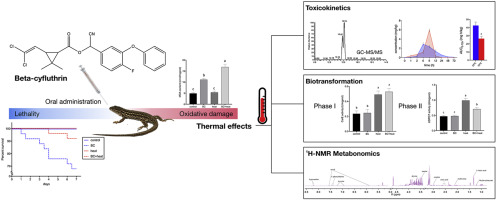当前位置:
X-MOL 学术
›
Environ. Res.
›
论文详情
Our official English website, www.x-mol.net, welcomes your
feedback! (Note: you will need to create a separate account there.)
Thermal effects on tissue distribution, liver biotransformation, metabolism and toxic responses in Mongolia racerunner (Eremias argus) after oral administration of beta-cyfluthrin.
Environmental Research ( IF 7.7 ) Pub Date : 2020-03-16 , DOI: 10.1016/j.envres.2020.109393 Zikang Wang 1 , Li Chen 2 , Luyao Zhang 2 , Wenjun Zhang 2 , Yue Deng 2 , Rui Liu 1 , Yinan Qin 1 , Zhiqiang Zhou 2 , Jinling Diao 1
Environmental Research ( IF 7.7 ) Pub Date : 2020-03-16 , DOI: 10.1016/j.envres.2020.109393 Zikang Wang 1 , Li Chen 2 , Luyao Zhang 2 , Wenjun Zhang 2 , Yue Deng 2 , Rui Liu 1 , Yinan Qin 1 , Zhiqiang Zhou 2 , Jinling Diao 1
Affiliation

|
Effects of temperature on metabolism/biotransformation and toxicokinetics to lizards are significant, but frequently ignored in toxicology studies. Beta-cyfluthrin (BC) is a pyrethroid insecticide and has been widely used globally. The study aimed to understand the diverse adverse effects of BC to the lizard (Eremias argus) at different temperature regimes. We carried out a single oral BC treatment (20 mg/kg bw) for toxicokinetic study and a 7-day BC (10 mg/kg bw) gavage to look at toxicology by monitoring changes in the biomarkers HSP70, SOD, MDA, CarE, UDPGT, GST, cyp genes, and other metabolic responses. Results showed that BC was lethal to lizards, showing oxidative damages in the liver at ambient temperature (25 °C). Heat stress (35 °C) could exacerbate the oxidative damage (MDA increased) caused by BC, due to the disorder of the antioxidant defense system. The result of tissue distribution and toxicokinetic study also showed that temperature affected the BC biotransformation in lizards. The biotransformation of BC maybe relates to the activation of CarE and UDGPT by heat stress. However, the cyp system and GST didn't increase under BC or/and heat treatments. 1H-NMR metabolomics analysis showed that BC or/and heat stress interfered with energy and amino acid metabolism of the liver. Unlike acute lethal toxicity, the occurrence of the BC and heat stresses has detrimental effects on lizard individuals and populations on sub-lethal levels. Our results indicate that pollution and global warming (or some other extremely weather) may generate significant and harmful effects on lizards.
中文翻译:

口服β-氟氰菊酯对蒙古赛马(Eremias argus)的组织分布,肝脏生物转化,代谢和毒性反应的热效应。
温度对代谢/生物转化和对蜥蜴的毒代动力学的影响是显着的,但在毒理学研究中经常被忽略。β-氟氰菊酯(BC)是拟除虫菊酯类杀虫剂,已在全球范围内广泛使用。该研究旨在了解不同温度下BC对蜥蜴(Eremias argus)的各种不利影响。我们进行了单次口服BC治疗(20 mg / kg bw)进行毒代动力学研究,并进行了为期7天的BC(10 mg / kg bw)管饲法,通过监测生物标志物HSP70,SOD,MDA,CARE, UDPGT,GST,cyp基因和其他代谢反应。结果表明,BC对蜥蜴具有致死性,在环境温度(25°C)下对肝脏具有氧化损伤。热应力(35°C)可能加剧BC造成的氧化损伤(MDA增加),由于抗氧化防御系统的紊乱。组织分布和毒代动力学研究的结果还表明,温度影响蜥蜴的BC生物转化。BC的生物转化可能与CarE和UDGPT受热应激的激活有关。然而,在BC或/和热处理下,cyp系统和GST并没有增加。1 H-NMR代谢组学分析表明,BC或/和热应激干扰肝脏的能量和氨基酸代谢。与急性致死毒性不同,BC和热应激的发生对亚致死水平的蜥蜴个体和种群具有有害影响。我们的结果表明,污染和全球变暖(或其他极端天气)可能会对蜥蜴产生重大而有害的影响。组织分布和毒代动力学研究的结果还表明,温度影响蜥蜴的BC生物转化。BC的生物转化可能与CarE和UDGPT受热应激的激活有关。然而,在BC或/和热处理下,cyp系统和GST并没有增加。1 H-NMR代谢组学分析表明,BC或/和热应激干扰肝脏的能量和氨基酸代谢。与急性致死毒性不同,BC和热应激的发生对亚致死水平的蜥蜴个体和种群具有有害影响。我们的结果表明,污染和全球变暖(或其他极端天气)可能会对蜥蜴产生重大而有害的影响。组织分布和毒代动力学研究的结果还表明,温度影响蜥蜴的BC生物转化。BC的生物转化可能与CarE和UDGPT受热应激的激活有关。然而,在BC或/和热处理下,cyp系统和GST并没有增加。1 H-NMR代谢组学分析表明,BC或/和热应激干扰肝脏的能量和氨基酸代谢。与急性致死毒性不同,BC和热应激的发生对亚致死水平的蜥蜴个体和种群具有有害影响。我们的结果表明,污染和全球变暖(或其他极端天气)可能会对蜥蜴产生重大而有害的影响。BC的生物转化可能与CarE和UDGPT受热应激的激活有关。然而,在BC或/和热处理下,cyp系统和GST并没有增加。1 H-NMR代谢组学分析表明,BC或/和热应激干扰肝脏的能量和氨基酸代谢。与急性致死毒性不同,BC和热应激的发生对亚致死水平的蜥蜴个体和种群具有有害影响。我们的结果表明,污染和全球变暖(或其他极端天气)可能会对蜥蜴产生重大而有害的影响。BC的生物转化可能与CarE和UDGPT受热应激的激活有关。然而,在BC或/和热处理下,cyp系统和GST并没有增加。1 H-NMR代谢组学分析表明,BC或/和热应激干扰肝脏的能量和氨基酸代谢。与急性致死毒性不同,BC和热应激的发生对亚致死水平的蜥蜴个体和种群具有有害影响。我们的结果表明,污染和全球变暖(或其他极端天气)可能会对蜥蜴产生重大而有害的影响。1 H-NMR代谢组学分析表明,BC或/和热应激干扰肝脏的能量和氨基酸代谢。与急性致死毒性不同,BC和热应激的发生对亚致死水平的蜥蜴个体和种群具有有害影响。我们的结果表明,污染和全球变暖(或其他极端天气)可能会对蜥蜴产生重大而有害的影响。1 H-NMR代谢组学分析表明,BC或/和热应激干扰肝脏的能量和氨基酸代谢。与急性致死毒性不同,BC和热应激的发生对亚致死水平的蜥蜴个体和种群具有有害影响。我们的结果表明,污染和全球变暖(或其他极端天气)可能会对蜥蜴产生重大而有害的影响。
更新日期:2020-03-16
中文翻译:

口服β-氟氰菊酯对蒙古赛马(Eremias argus)的组织分布,肝脏生物转化,代谢和毒性反应的热效应。
温度对代谢/生物转化和对蜥蜴的毒代动力学的影响是显着的,但在毒理学研究中经常被忽略。β-氟氰菊酯(BC)是拟除虫菊酯类杀虫剂,已在全球范围内广泛使用。该研究旨在了解不同温度下BC对蜥蜴(Eremias argus)的各种不利影响。我们进行了单次口服BC治疗(20 mg / kg bw)进行毒代动力学研究,并进行了为期7天的BC(10 mg / kg bw)管饲法,通过监测生物标志物HSP70,SOD,MDA,CARE, UDPGT,GST,cyp基因和其他代谢反应。结果表明,BC对蜥蜴具有致死性,在环境温度(25°C)下对肝脏具有氧化损伤。热应力(35°C)可能加剧BC造成的氧化损伤(MDA增加),由于抗氧化防御系统的紊乱。组织分布和毒代动力学研究的结果还表明,温度影响蜥蜴的BC生物转化。BC的生物转化可能与CarE和UDGPT受热应激的激活有关。然而,在BC或/和热处理下,cyp系统和GST并没有增加。1 H-NMR代谢组学分析表明,BC或/和热应激干扰肝脏的能量和氨基酸代谢。与急性致死毒性不同,BC和热应激的发生对亚致死水平的蜥蜴个体和种群具有有害影响。我们的结果表明,污染和全球变暖(或其他极端天气)可能会对蜥蜴产生重大而有害的影响。组织分布和毒代动力学研究的结果还表明,温度影响蜥蜴的BC生物转化。BC的生物转化可能与CarE和UDGPT受热应激的激活有关。然而,在BC或/和热处理下,cyp系统和GST并没有增加。1 H-NMR代谢组学分析表明,BC或/和热应激干扰肝脏的能量和氨基酸代谢。与急性致死毒性不同,BC和热应激的发生对亚致死水平的蜥蜴个体和种群具有有害影响。我们的结果表明,污染和全球变暖(或其他极端天气)可能会对蜥蜴产生重大而有害的影响。组织分布和毒代动力学研究的结果还表明,温度影响蜥蜴的BC生物转化。BC的生物转化可能与CarE和UDGPT受热应激的激活有关。然而,在BC或/和热处理下,cyp系统和GST并没有增加。1 H-NMR代谢组学分析表明,BC或/和热应激干扰肝脏的能量和氨基酸代谢。与急性致死毒性不同,BC和热应激的发生对亚致死水平的蜥蜴个体和种群具有有害影响。我们的结果表明,污染和全球变暖(或其他极端天气)可能会对蜥蜴产生重大而有害的影响。BC的生物转化可能与CarE和UDGPT受热应激的激活有关。然而,在BC或/和热处理下,cyp系统和GST并没有增加。1 H-NMR代谢组学分析表明,BC或/和热应激干扰肝脏的能量和氨基酸代谢。与急性致死毒性不同,BC和热应激的发生对亚致死水平的蜥蜴个体和种群具有有害影响。我们的结果表明,污染和全球变暖(或其他极端天气)可能会对蜥蜴产生重大而有害的影响。BC的生物转化可能与CarE和UDGPT受热应激的激活有关。然而,在BC或/和热处理下,cyp系统和GST并没有增加。1 H-NMR代谢组学分析表明,BC或/和热应激干扰肝脏的能量和氨基酸代谢。与急性致死毒性不同,BC和热应激的发生对亚致死水平的蜥蜴个体和种群具有有害影响。我们的结果表明,污染和全球变暖(或其他极端天气)可能会对蜥蜴产生重大而有害的影响。1 H-NMR代谢组学分析表明,BC或/和热应激干扰肝脏的能量和氨基酸代谢。与急性致死毒性不同,BC和热应激的发生对亚致死水平的蜥蜴个体和种群具有有害影响。我们的结果表明,污染和全球变暖(或其他极端天气)可能会对蜥蜴产生重大而有害的影响。1 H-NMR代谢组学分析表明,BC或/和热应激干扰肝脏的能量和氨基酸代谢。与急性致死毒性不同,BC和热应激的发生对亚致死水平的蜥蜴个体和种群具有有害影响。我们的结果表明,污染和全球变暖(或其他极端天气)可能会对蜥蜴产生重大而有害的影响。











































 京公网安备 11010802027423号
京公网安备 11010802027423号